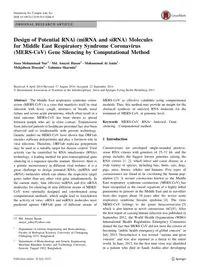
2015 Design of Potential RNAi (miRNA and siRNA) Molecules for Middle East Respiratory Syndrome Coronavirus (MERS-CoV) Ge PDF
Preview 2015 Design of Potential RNAi (miRNA and siRNA) Molecules for Middle East Respiratory Syndrome Coronavirus (MERS-CoV) Ge
ORIGINAL RESEARCH ARTICLE Design of Potential RNAi (miRNA and siRNA) Molecules for Middle East Respiratory Syndrome Coronavirus (MERS-CoV) Gene Silencing by Computational Method Suza Mohammad Nur1 • Md. Anayet Hasan1 • Mohammad Al Amin1 • Mehjabeen Hossain1 • Tahmina Sharmin2 Received: 8 April 2014 / Revised: 17 August 2014 / Accepted: 22 September 2014 � International Association of Scientists in the Interdisciplinary Areas and Springer-Verlag Berlin Heidelberg 2015 Abstract The Middle East respiratory syndrome coron- avirus (MERS-CoV) is a virus that manifests itself in viral infection with fever, cough, shortness of breath, renal failure and severe acute pneumonia, which often result in a fatal outcome. MERS-CoV has been shown to spread between people who are in close contact. Transmission from infected patients to healthcare personnel has also been observed and is irredeemable with present technology. Genetic studies on MERS-CoV have shown that ORF1ab encodes replicase polyproteins and play a foremost role in viral infection. Therefore, ORF1ab replicase polyprotein may be used as a suitable target for disease control. Viral activity can be controlled by RNA interference (RNAi) technology, a leading method for post transcriptional gene silencing in a sequence-specific manner. However, there is a genetic inconsistency in different viral isolates; it is a great challenge to design potential RNAi (miRNA and siRNA) molecules which can silence the respective target genes rather than any other viral gene simultaneously. In the current study, four effective miRNA and five siRNA molecules for silencing of nine different strains of MERS- CoV were rationally designed and corroborated using computational methods, which might lead to knockdown the activity of virus. siRNA and miRNA molecules were predicted against ORF1ab gene of different strains of MERS-CoV as effective candidate using computational methods. Thus, this method may provide an insight for the chemical synthesis of antiviral RNA molecule for the treatment of MERS-CoV, at genomic level. Keywords MERS-CoV � RNAi � Antiviral � Gene silencing � Computational method 1 Introduction Coronaviruses are enveloped single-stranded positive- sense RNA viruses with genomes of 25–32 kb, and the group includes the biggest known genomes among the RNA viruses [1, 2], which infect and cause disease in a wide variety of species, including bats, birds, cats, dogs, pigs, mice, horses, whales and humans. Five types of coronaviruses are found to be circulating the human pop- ulation [3]. A second coronavirus known as the Middle East respiratory syndrome coronavirus (MERS-CoV) has been recognized as the causal organism of a highly lethal pneumonia in patients in the Middle East and in travellers from this region about 10 years after the severe acute respiratory syndrome became epidemic [4]. The virus MERS-CoV belongs to the genus betacoronavirus [5] which is also known as novel coronavirus (nCoV). After the first report of causing human infection was published in September 2012, the World Health Organization (WHO) International Health Regulations Emergency Committee denied the fact that MERS-CoV did not meet the criteria of becoming ‘‘public health emergency of global concern’’ in July 2013. Nevertheless it was termed ‘‘serious and great concern’’ and was also reported as a threat to the entire world. In June, 2012, for the first time virus was identified in a patient who died in Saudi Arabia after developing & Md. Anayet Hasan
